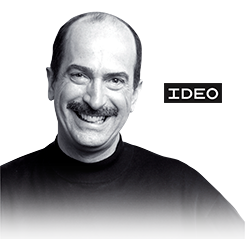
Tom Kelley practices innovation every day. His ability to foster a culture of creativity in the companies he works with has made him one of the most beloved figures in innovation. Tom is Chairman of D4V Design For Venture, a venture capital firm with IDEO to enable Japanese startups. Tom’s current book, Creative Confidence, is an out-ofthe-box success; in its first week, it was already among the best-selling business books in the country, leading the field in motivational leadership and problem-solving.
Creative Confidence is a guide to recognising and unleashing the creative potential in every employee. Too often, companies and individuals assume that creativity and innovation are the domain of the “creative types” — artists, writers, the design team. But every one of us has the potential to be creative; creativity is a mindset that anyone can cultivate, not a personality trait you either have or you don’t. And in a marketplace where competitiveness is defined by innovation, the more creativity you unlock across the board, the more likely you are to succeed. Creative Confidence was co-written with Tom’s brother David Kelley, the founder of IDEO and creator of the Stanford d.school, and the book draws on both brothers’ extensive work through these institutions with many of the world’s top companies.
This is just the latest step in Tom’s highly respected career as a leader in innovation management and design. Under his management, IDEO has won more admiration and awards than any other design firm in the last decade. At the heart of IDEO’s success is the Creative Confidence philosophy: everyone can contribute creatively to a project if innovation is part of an organization’s way of life.
Tom’s earlier books include The Art of Innovation, which describes IDEO’s “deep dive” approach to successful product creation, focusing on brainstorming and teamwork as invaluable tools. The Ten Faces of Innovation shares ten unique strategies for making sure that good ideas make it to market. Tom was named the first-ever Executive Fellow by the dean of the Haas Business School, University of California Berkeley, and received the 2009 Kellogg Award for Distinguished Leadership from the Kellogg School of Management, Northwestern University.
Meet Tom Kelley
Tom Kelley works with dozens of clients each year, using the power of storytelling to build the trust of leaders and organizations around the world. He has been a partner at IDEO for over 30 years, where he has helped grow the company, starting from 15 employees and reaching more than 700. In addition to the number of staff, the company has expanded in the field of services in areas such as: assistance medical, government and education. Contributes to the mission of refreshing the creative leadership of IDEO Tokyo.
Tom is a best-selling author, along with his brother, IDEO founder David Kelley. Beyond that, he is an executive member of the Haas School of Business at UC Berkeley and the University of Tokyo. Tom travels around the world, discussing and harnessing the creative potential of individuals and organizations and creating a culture of innovation. His hobbies include long walks and cycling to the office.
He believes that the hardest part is not solving the problem, but identifying the challenge. Gaining a deeper understanding of customer needs is essential in reformulating the problem.
Tom Kelley’s advice includes: organization leaders must support their employees and keep in mind some unwritten rules of organizational culture, for example: if the slightest failure is punished by superiors, then people will understand that among these principles also counts the fact that failure is not okay.
Ignore the surface details and ask yourself what the core of the ideas is. It allows the free flow of ideas, it does not let the decision-making hierarchy inhibit people from speaking, even the opinions of introverts must be seen and heard.